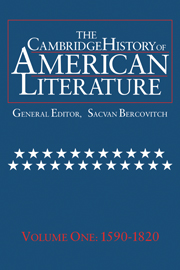Book contents
- Frontmatter
- Introduction
- THE LITERATURE OF COLONIZATION
- NEW ENGLAND PURITAN LITERATURE
- BRITISH-AMERICAN BELLES LETTRES
- THE AMERICAN ENLIGHTENMENT, 1750–1820
- 1 Finding the Revolution
- 2 What is Enlightenment? Some American Answers
- 3 Religious Voices
- 4 Writing the Revolution
- 5 The Literature of Public Documents
- 6 The Limits of Enlightenment
- THE LITERATURE OF THE REVOLUTIONARY AND EARLY NATIONAL PERIODS
- Chronology
- Bibliography
- Index
6 - The Limits of Enlightenment
from THE AMERICAN ENLIGHTENMENT, 1750–1820
Published online by Cambridge University Press: 28 March 2008
- Frontmatter
- Introduction
- THE LITERATURE OF COLONIZATION
- NEW ENGLAND PURITAN LITERATURE
- BRITISH-AMERICAN BELLES LETTRES
- THE AMERICAN ENLIGHTENMENT, 1750–1820
- 1 Finding the Revolution
- 2 What is Enlightenment? Some American Answers
- 3 Religious Voices
- 4 Writing the Revolution
- 5 The Literature of Public Documents
- 6 The Limits of Enlightenment
- THE LITERATURE OF THE REVOLUTIONARY AND EARLY NATIONAL PERIODS
- Chronology
- Bibliography
- Index
Summary
A dominating frame of reference assimilates the crises in meaning and the contradictions in practice that it generates. The Enlightenment shapes early republican culture in just this way. It is both the source of ideas and the boundary placed upon them in revolutionary America, both the expression of broad aspirations and the enforcement of narrow instrumental controls. The literature of public documents offers a proximate case in point. The Federal Constitution of 1787 embodies the central aspirations of the Enlightenment. In daring to know and then in imposing their knowledge, the framers assume the capacity of reason to define and control human society. Their text, the Constitution, celebrates the association between correct human mechanism and universal improvement. Knowledge, through mechanism, forms a more perfect union that will establish justice, insure tranquillity, promote the general welfare, and secure the blessings of liberty for the people of the United States. Yet, at another level, the body and mechanics of the Constitution take back the scope and sweep of its preamble.
Not everyone in America is so insured, so promoted, so secured, so blessed. Quietly but emphatically, the Constitution eliminates whole categories from the rubric of “we, the people.” In a shocking adaptation of the mathematical penchants of the Enlightenment, the Constitution, in Articles 1 and 4, perpetuates the institution of slavery and reduces all individuals who are not “free” to three-fifths of a person. Again in Article 1, it excludes Native Americans from the apportionment of representation and gives Congress an exclusive power in commerce over them.
- Type
- Chapter
- Information
- The Cambridge History of American Literature , pp. 496 - 538Publisher: Cambridge University PressPrint publication year: 1994
- 1
- Cited by

